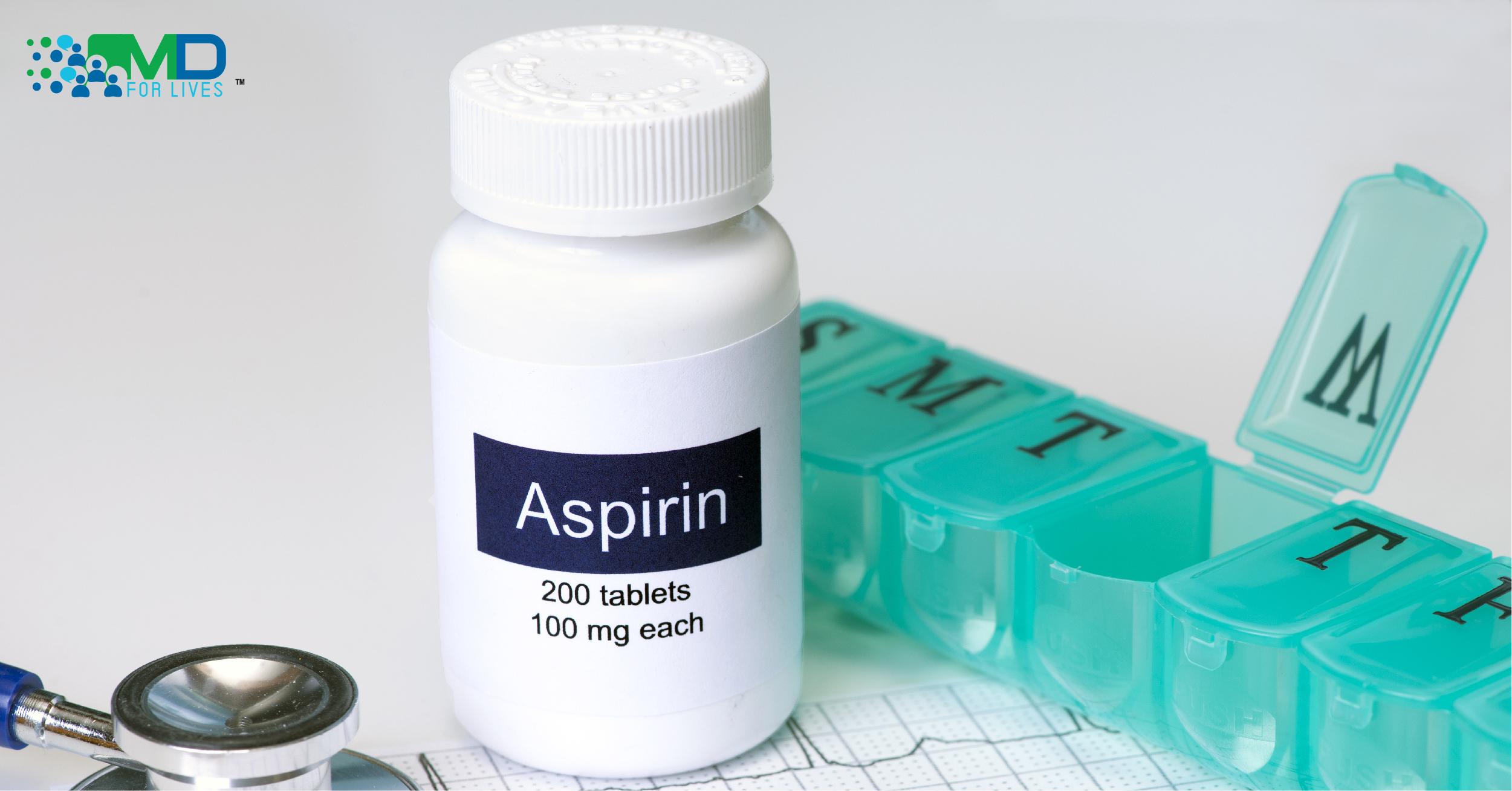Aspirin, one of the most widely used drugs for a variety of indications has been the mainstay of analgesic/anti-inflammatory drug therapy for the past 75 years. Aspirin, a non-steroid anti-inflammatory drug (NSAID) is recognized for analgesic, antipyretic and anti-inflammatory properties. The template for the synthesis of novel non-steroidal anti-inflammatory drugs was set in the discovery of aspirin. Yet, some uncertainties still linger regarding the use of aspirin, and even after 120 years of its synthesis, aspirin continues to attract research and debate. In this blog post, let us discuss some of the Aspirin Benefits.
Mechanism of Action of Aspirin
Prostaglandins sustain homeostatic functions (protect against gastric mucosal damage, and platelet aggregation) and play a pivotal role in generating inflammatory response, associated with cardinal signs of inflammation- redness, swelling, pain, and fever.
Prostaglandin synthesis depends on the activity of the enzyme prostaglandin G/H synthases also known as cyclooxygenase (COX). The two COX isoforms are (i) COX-1, a constitutive isoform that maintains homeostatic functions; (ii) COX-2, an inducible isoform generated by pro-inflammatory mediators. Both COX-1 and COX-2 catalyze the conversion of arachidonic acid, a fatty acid in the cell membrane to prostaglandins. Aspirin and other non-steroid anti-inflammatory drugs (NSAIDs) inhibit the activity of both COX-1 and COX-2 and prevent the production of prostaglandins that contribute to the inflammatory response. In addition to modulating the inflammatory response, aspirin induces gastric mucosal damage and also inhibits platelet aggregation. The therapeutic action of aspirin is largely due to COX-2 inhibition and adverse reactions are due to COX-1 inhibition.

Risks & Aspirin Benefits – Pregnancy, Cancer, Cardiovascular diseases and Other Conditions
Millions of people take aspirin, either by prescription or over-the-counter. For decades, aspirin has been on the WHO model list of essential medicines. Aspirin, the cyclooxygenase inhibitor is effective in treating myocardial infarction, stroke and other cardiovascular migraine. In addition, aspirin therapy has been shown to be an effective treatment for headaches, rheumatic fever, Kawasaki disease, etc. Studies suggest daily low-dose of aspirin can prevent cancer, preeclampsia, and cardiovascular diseases.
Aspirin, the antiplatelet therapy usage was so promising that for years experts recommended daily low-dose aspirin to prevent cardiovascular diseases. But recent studies suggest daily aspirin use is associated with serious side effects, principally internal bleeding. The side effects may be prevented by careful consideration of the patient’s risk factors and by the implementation of preventive strategies.
Risks and Benefits of Aspirin in Pregnancy
Preeclampsia is the leading cause of maternal and fetal morbidity and mortality. Low-dose aspirin is effective in preventing preeclampsia in women with high-risk factors such as the previous history of preeclampsia, multiple pregnancy, chronic hypertension, type 1 or type 2 diabetes, renal disease, and autoimmune disease.
Evidence suggests low-dose aspirin initiated in early pregnancy reduced the incidence of preeclampsia and intrauterine growth restriction (IUGR).
Low-dose aspirin was found to be effective in preventing preeclampsia and reducing preterm delivery and perinatal mortality in nulliparous women with a singleton pregnancy.
The antithrombotic effect of aspirin can lead to maternal and fetal bleeding. [9]Aspirin can cross the placental barrier and disrupt the vascular disruption and platelet aggregation in the fetus.[10] Few studies suggest that using aspirin during the first trimester of pregnancy is associated with an increased risk of gastroschisis.
Risks and Benefits of Aspirin in Cancer
Long-term aspirin can reduce overall cancer risk including colorectal cancer, prostate cancer, breast cancer, hepatocellular carcinoma, ovarian cancer. It is also found that aspirin is effective in reducing gastrointestinal cancer mortality. [17] The evidence of reducing colorectal cancer is so strong that US Preventive Services Task Force (USPSTF) has recommended aspirin to prevent colorectal cancer in certain groups.
Aspirin can reduce cancer mortality and the risk of developing cancer. But a recent study called ASPREE suggests aspirin has an adverse effect on the later stage of cancer in older adults. Aspirin is found to accelerate the progression of cancer and increase the risk of mortality.
Risks and Benefits of Aspirin in Cardiovascular Disease
For decades aspirin has been recommended for primary and secondary prevention of cardiovascular disease (CVD). Aspirin is proven to be the cornerstone of the antithrombotic management of patients with CVD, can reduce the mortality and recurrence of cardiovascular events in acute coronary syndrome (ACS), Kawasaki’s disease, and thrombotic stroke.
For years, experts have been recommending daily low-dose aspirin to prevent cardiovascular disease. The antiplatelet effect of aspirin reduces thrombus formation that leads to heart attack and stroke, and daily use of aspirin can lower the risk of myocardial infarction, ischemic stroke, and also other vascular events. But long-term aspirin use is also associated with an increased risk of hemorrhagic adverse events.
A recent study suggests aspirin use is associated with a serious risk of internal bleeding, and the risks of daily aspirin use outweigh the benefits, suggesting that aspirin should no longer be recommended for primary prevention of CVD.
A large clinical trial found that a daily low-dose aspirin in healthy older adults didn’t prolong life or help prevent heart disease and also higher all-cause mortality was observed. Aspirin is no longer recommended to prevent CVD in adults aged 70 and older or for those with a higher risk of bleeding.
Risks and Aspirin Benefits in Other Conditions
Aspirin has been a standard part of treatment for Kawasaki disease. Studies suggest low-dose aspirin does not increase the risk of coronary artery damages. Reye’s syndrome has been linked to aspirin use but the association has not been supported by sufficient facts.
Studies suggest high-dose aspirin is safe and effective in treating acute migraine headaches. Further research suggests low-dose aspirin has the potential to prevent recurrent migraine headaches.
Adverse Effects of Aspirin
Surgery – Aspirin use is often associated with an increased risk of per- and postoperative bleeding. Hence, aspirin treatment is recommended to discontinue before surgery.
Internal bleeding – Daily aspirin use can increase the risk of internal bleeding particularly gastrointestinal bleeding. Studies suggest low-dose aspirin can increase the risk of intracranial hemorrhage.
Daily aspirin can prevent heart attack and stroke but it is not for everyone. Aspirin treatment should be considered for patients who are at high risk of CVD and low risk of bleeding, and should not be recommended for healthy people above 70. The balance between benefits and the risks must be considered and self-prescription is not recommended.








2 Comments
Low Dose Aspirin: Benefits, studies & findings | MDforLives Blog
5 years ago[…] benefits of aspirin are greatest for colorectal cancer, it significantly reduces the incidence and mortality in […]
Benefits of Low-Dose Aspirin - MDForLives
4 years ago[…] benefits of aspirin are greatest for colorectal cancer, it significantly reduces the incidence and mortality in […]